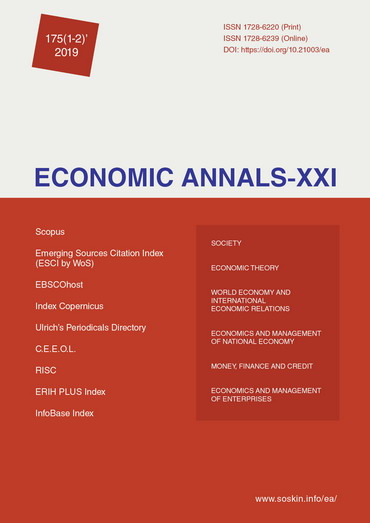Economic policy-makers and economic experts in the countries of Central and Eastern Europe: ways of interaction
Economic policy-makers and economic experts in the countries of Central and Eastern Europe: ways of interaction
Author(s): Oleksii Tretiak, Vadym Negodchenko, Volodymyr Toryanyk, Alexander CapSubject(s): Economic policy, Socio-Economic Research
Published by: Institute of Society Transformation
Keywords: Economic Policy; Economic Decision Making; Experts’ Recommendations; Effectiveness; Transitive States;
Summary/Abstract: Contemporary economic policy is a complex formation, which requires not only managerial priorities consideration, but also the explanation of scientific and technical expertise procedures. Changing socioeconomic situation cause a demand for a well-considered professional approach and systematic monitoring of diverse economic and social information. In this context, the peculiarities of expert recommendations advancement within the economic decision-making environment prescribe careful attention to the multidisciplinary context. The differences between the economic experts’ and decision-makers within the framework of economic policy cause multidisciplinary alignment of positions and decision-making. Therefore, the specifics of the public experts and officials’ communicative interaction inside the framework of state economic policy makes necessary the distinguishing between the areas of responsibility of the expert community and government officials for its results. The development of the adequate economic policy gives significant value to qualitative parameters of experts’ behavior which makes it possible to see the functions of expert activity. An economic view of society’s life increases realism in management processes. Meanwhile, the populist opposition to economic policy in many countries over the world is not only a manifestation of political sympathies and the support to the certain political forces, but also to the certain economic doctrines. The real impact of economic experts on economic policy has to be traced taking into account the general requirements for government actions by economic players and the main consumers of public services. At the present stage, despite considerable progress in modernizing the economy and European integration, some transit states of Central and Eastern Europe show a step back from the principles of openness and broad discussion of economic strategies. This indicates the domination of political considerations over economic in the processes of economic policy making. Positions of economic policy-makers can also be expressed on the basis of certain statements and their interpretation. At the same time, economic deliberation is an important stage in shaping economic policy not only at the approval stage, but also at the stage of development and corrections introduction. Specifics of interaction of external economic experts with governments of Central and Eastern Europe transitive countries are investigated in this paper. The assumptions were made that planned achievement indicators in market economy are a fairly relative parameters, so the economic policy results may be technological changes, infrastructure improvements and other aspects that do not have gross indicators or index changes. In this context, the careful consideration of the elaboration of expert proposals is an important factor in the legitimization of economic policy. The main recommendations for the contemporary transition countries governments in the context of cooperation with external experts were given in the paper.
Journal: Економічний часопис - ХХІ
- Issue Year: 175/2019
- Issue No: 01+02
- Page Range: 10-17
- Page Count: 8
- Language: English

